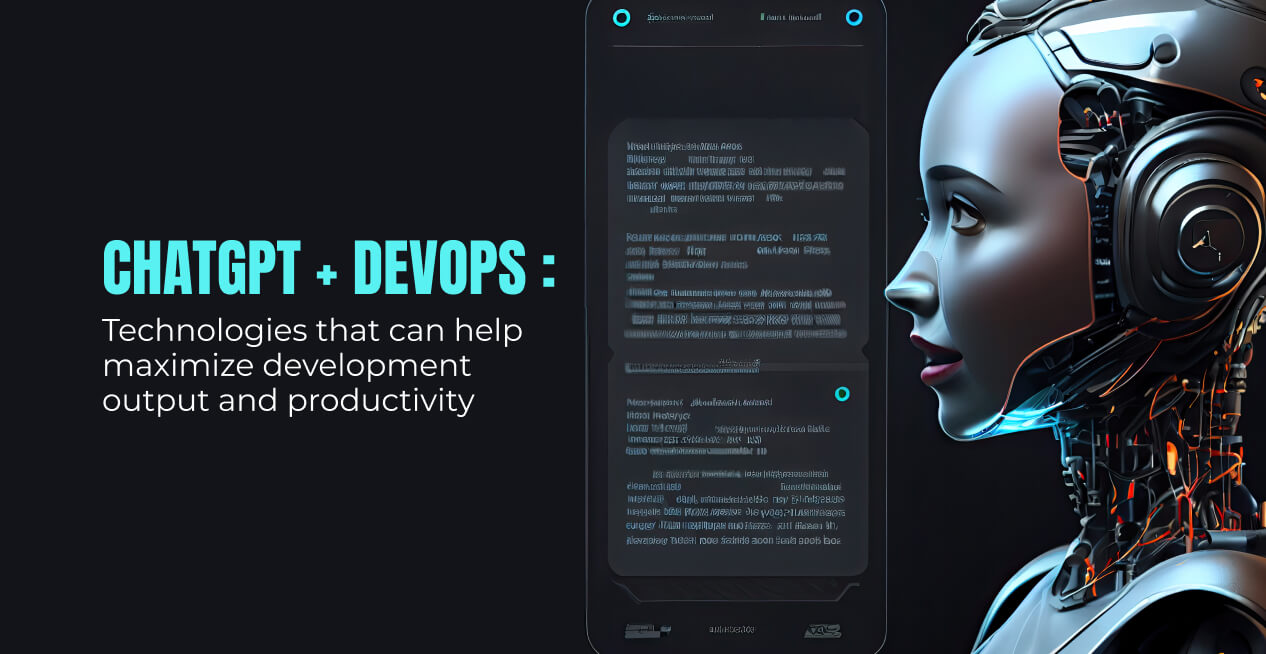Introduction
“GPT Chat is like a modern-day Robin Hood, taking from the rich search engines and giving to the needy.”― Arif Naseem. While some agree with this narrative, others don’t. However, everyone seems to accept the fact that the start of the next technological revolution is ChatGPT and it is here to stay! Ever since Chat GPT was introduced in November of 2022, it has garnered a lot of attention in almost all industries, for its limitless possibilities. One such industry is software development.
Software development industry has welcomed ChatGPT with open arms. From writing challenging, error-free code to automating menial repetitive tasks, Chat GPT is capable of doing all this and more. DevOps teams are raving about how ChatGPT is revolutionizing software development and reducing the day’s worth of work to minutes!. Let us have a look at what DevOps and ChatGPT is and how the former can use the latter to its advantage.
What is DevOps?
DevOps refers to the methodology in the software development and IT industry. With the help of a set of practices and tools, DevOps integrates and automates the work of software development and IT operations both. The primary objective is to improve and shorten the systems development life cycle. In the software development industry, the work culture and process methodologies are constantly evolving. The main motto of this is to facilitate software development in a way where it is ergonomic, takes optimum resources, and less time.
What is ChatGPT?
Developed by OpenAI, ChatGPT is an artificially intelligent chatbot. It is built on OpenAI’s GPT-3.5 and GPT-4 families of large language models and has been fine-tuned using machine learning.ChatGPT’s auto generated solutions are conversational and was primarily created for online customer care. Its Natural Language Processing (more commonly known as NLP) feature makes the solutions humane and precise. ChatGPT refers to websites, research papers, textbooks, and various articles for its data. Once the user makes a query, almost instantaneously ChatGPT provides a unique, verified answer. It is also capable of coding languages, writing and creating content, and solving complex problems.
Click here to know which AI chatbot is best in between ChatGPT vs Google BARD vs Bing Chat.
Ways to use ChatGPT for DevOps
As we all know, DevOps engineering is a more productive way of software development. By amalgamating the two processes of Operation and Development, DevOps engineers minimize the time taken for a software development process while increasing the efficiency of the development team and ensuring a better quality of the product. Similarly, ChatGPT is also getting popular for increasing the productivity of the development processes. When we use ChatGPT in DevOps engineering, we further simplify and speed up the developmental procedure thus making the best of both technologies.
Here are a few ways ChatGPT can be used in combination with DevOps development methodology.
Automating repetitive tasks
Software development processes have many repetitive tasks which ChatGPT can take care of. A few of them include reports collection, updating databases, analyzing and inspecting logs and feedback, all in real-time. These tasks take up a lot of time when done manually by software engineers. With ChatGPT, however, one can easily automate these tasks while removing the scope for human error.
Streamlining process flows
Streamlining development processes means eliminating non-essential work-related tasks with the help of modern tools, techniques, and resources. ChatGPT cuts down the number of tasks that developers have to perform, by automating them and simplifying them.
Automated Deployment
ChatGPT’s chatbot is great at automating the deployment process of a software product. Once a product is ready, ChatGPT is equipped to run tests and deploy code to different platforms. Another added feature of ChatGPT that stands out is that it can accommodate continuous integration and continuous delivery (CI/CD) pipelines. This promises users of the continuous delivery of code.
Risk Mitigation and Incident handling
Troubleshooting is a major part of the software development process and ChatGPT is a boon when it comes to resolving errors. The intelligent chatbot has the capability to resolve issues and mitigate risks. Chat GPT helps diagnose problems in code and predict errors along with giving step-by-step guidance to resolve such errors.
Apart from these, ChatGPT is also known for its interactive query handler that instinctively answers queries of software developers about code, workflows, etc. It is truly a boon for DevOps engineers when it comes to combining already extensive tasks of development and deployment.
Best practices for ChatGPT to keep in mind
While amalgamating ChatGPT with DevOps, there are certain practices that can help you make the best use of ChatGPT in your development processes. Here are a few of them,
- Creating the correct, concise prompt is crucial for ChatGPT’s best response. Make sure the prompt is clear and crisp.
- For extensive answers, AI-human conversations will be needed, so you must know exactly what you are looking for.
- Including examples and references in prompts help the chatbot to give more precise solutions.
- Generate smaller scripts in ChatGPT as it is more useful and precise for simpler solutions.
Advantages and Disadvantages of ChatGPT in DevOps
As mentioned above, ChatGPT has many advantageous features to boast especially when combined with DevOps methodology. Few additional advantages are:
- Improved conflict error resolution
- Better efficiency and increased productivity
- Quick learning
- Better collaboration among the team, stakeholders, and clients
- Time conservation
- Smooth workflows etc.
However, there are also disadvantages to this combination of technologies, which one can hope future versions of ChatGPT will resolve. These are:
- ChatGPT lacks human touch: ChatGPT cannot improvise as a human does. Also, the content generated with Chat GPT can lack depth and profundity.
- The chatbot is still learning: ChatGPT is trained to learn and improve consistently. The chatbot is still in its early stages and needs more development.
- ChatGPT lacks definitive answers: The answers given by the smart platform are lengthy and descriptive and can be overwhelming for users who are looking for direct answers.
Case Studies and examples of ChatGPT in DevOps
Given below are successful examples of ChatGPT incorporation in DevOps:
NVIDIA
Leading graphics processing unit (GPU) manufacturer, NVIDIA, is one of the finest examples of ChatGPT incorporated DevOps. The team automated their code assessment with the help of a chatbot. How? Well, the developers trained the chatbot to accept and understand the code assessment input while giving feedback on the quality of the code and its potential performance. It was also taught to predict and detect errors in the code. There was a significant increase in the productivity of the team and the project took less time.
Salesforce
Salesforce is another one of the technical giants who has decided to use ChatGPT for its benefits. The company has even developed its own Einstein GPT, an artificially intelligent and generative customer service chatbot based on ChatGPT. EinsteinGPT is designed to manage emailers, plan meetings and provide customer insights and more. It is integrated within the CRM system of salesforce.
AirIndia
Recently reacquired, AirIndia has planned to revamp its customer service by incorporating ChatGPT on its website. It has also become the first aviation company to do so, in India. The chatbot’s latest version ChatGPT4 will be included on the website to improve website’s performance and customer interactions.
Bain and Company
Bain and Company, a top management consultant firm, is yet another big corporate giant who has jumped on the ChatGPT bandwagon. It has incorporated ChatGPT in building a management tool which will be used by Coca-Cola, a major consumer product manufacturer to automate their management processes.
Conclusion
Capabilities of ChatGPT are profound. From complete automation of developmental and operational tasks to letting AI handle customer service, ChatGPT is revolutionizing the software development industry as we know it. Any DevOps company is sure to boost their productivity with ChatGPT. On the other hand, businesses who are looking to hire dedicated developers for mobile app development must invest in DevOps firms currently using ChatGPT for ergonomic and time-friendly software development.
COMMENT
No Comments found.
DETAILED INDUSTRY GUIDES
Software Development - Step by step guide for 2021 and
beyond | OpenXcell
Learn everything about Software Development, its types, methodologies, process outsourcing with our complete guide to software development.
Headless CMS - The complete guide for 2021 | OpenXcell
Learn everything about Headless CMS along with CMS, its types, pros & cons as well as use cases, and real-life examples in a complete guide.
Mobile App Development - Step by step guide for 2021 and beyond | OpenXcell
Building your perfect app requires planning and effort. This guide is a compilation of best mobile app development resources across the web.
DevOps - A complete roadmap for software transformation | OpenXcell
What is DevOps? A combination of cultural philosophy, practices, and tools that integrate and automate between software development and the IT operations team.
GET QUOTE
INSIGHTS INTO TECH
The inception of ChatGPT in 2022 marked the wide-scale adoption of Artificial Intelligence in application development. In the field of creating mobile apps, AI-powered tools and frameworks have become indispensable…
Read more...
Introduction Most industries have turned to AI to stay ahead of the competition in the evolving tech landscape. The construction industry is no stranger to this trend. The advent of…
Read more...
Introduction Digital transformation needs no introduction; it is evolving as a norm in many industries. The paradigm transition it brings to the retail landscape is evident from the latest predictions.…
Read more...





